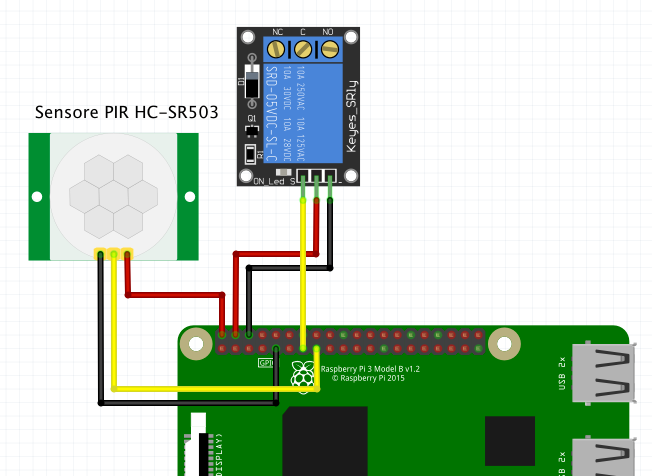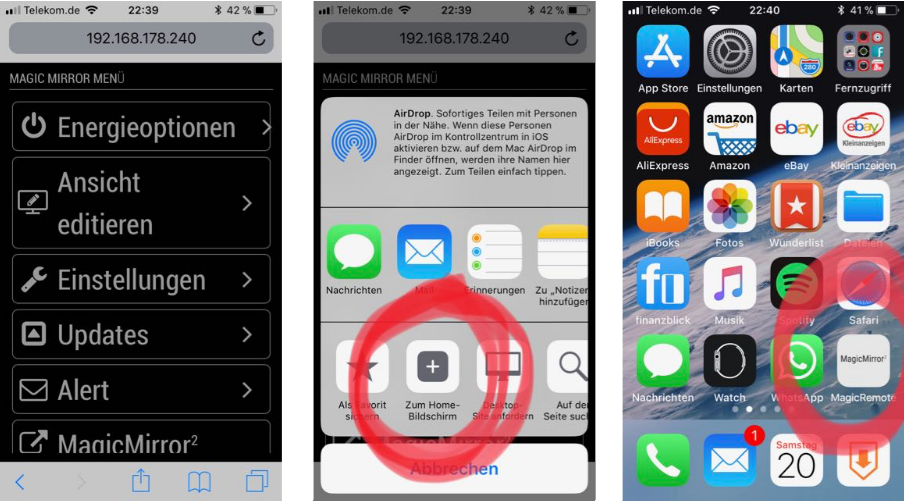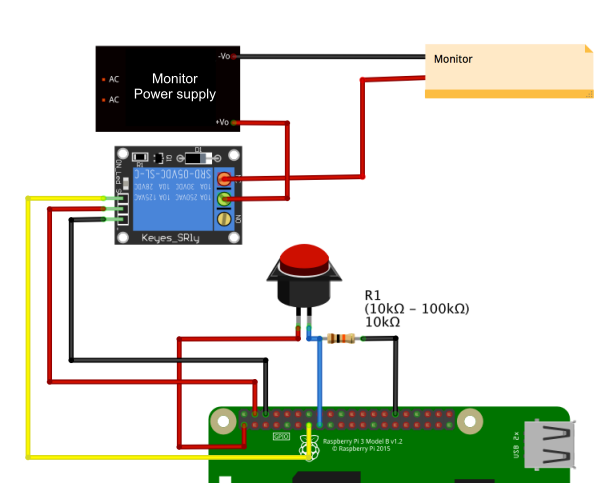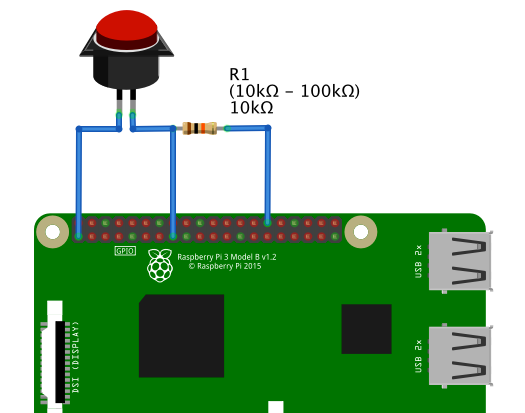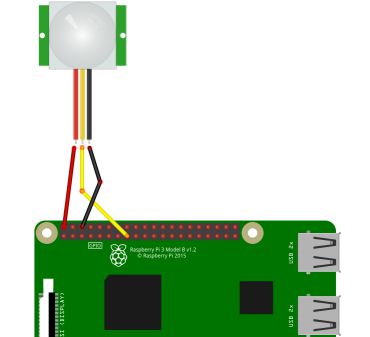Read the statement by Michael Teeuw here.
{HowTo} turn on/off your monitor (Time based, PIR/Button, App)
-
@hnperkins yes, if it’s always showing a 1 then your sensor is ‘inverted’ to the standard way most pir boards work. Note it should go to 0 when the pir detects movement (you might need to continually wave your hand in front of the pir at the exact moment you hit enter after typing the gpio read to see the 0. If you never see a 0 then you may have a faulty pir).
Although I initially did get my ‘inverted’ sensor working using the invert configuration option in paviros module, it eventually stopped working correctly (my mirror would register a false detection every 3 mins or so causing my screen to stay always on). Not sure why it broke… seemed to happen after I upgraded to a newer version of mm, but issue didn’t go away after I tried rolling back. Final thing I did to stop false triggering was to install a ferrite choke on my input wire & to move where my pi sat at the back of my monitor (it was quite close to the monitors power converter initially).
Ultimately the way I got it working was to buy a different pir board (the kind with the 2 potentiometers for sensitivity & time adjustment) which also happened to be 0 for no movement & 1 for movement). I then used the pir.py script instead of the module to trigger screen on / off. I was fairly sure it wasn’t a single faulty pir unit (mine came in a pack of 3) but nothing I did got it working so in the end spending an extra fiver on a different type of pir seemed worth it to me.
-
I had the script running and all I got was “…” turns out I had the POWER and GROUND swapped because I was following the drawing on the initial post. I suggest looking at the your PIR board to make sure you are connecting the wires on the correct order.
Overall fantastic write up. Thanks for sharing
-
@fabbr i just got it working today. hadn’t had time to mess with it much. i was able to invert it in the config for the plugin and its been working great
-
I used the method 2.2 Using PIR-Script and it work fine however, after a long period of time (that the screen is off and I am not doing anything on the raspberry) when I move in front of the PIR I can see the ON signal is sent to my monitor (the monitor LED change) but all I get is a blank screen.
I did some testing and notice that when I connect with VNC to the raspberry the screen immediately comes back on so it makes me wonder if there’s some kind of screensaver or something of that nature that is on.
Does anyone knows anything about this or had this problem before?
-
Have you disabled the screensaver? The easiest, most common way of doing that is to install xscreensaver and disable the screensaver that way
-
@Mykle1 Thank you that was the problem. Xscreensaver was easy use. Thanks
Another problem I had was: when I changed the orientation of my monitor when it was coming back on all I saw was a black screen… so I did more research and found that that I could replace the tvservice for:
vcgencmd display_power 0turns off the screenvcgencmd display_power 1turns on the screenThat worked better with my monitor for some reason.
-
Thanks for this tutorial…
I am using a PIR. The monitor switches on immediately after detection of motion. I am looking for an option to switch on the monitor if a person stands in front of it for 10 seconds. Mine is a floor mirror, so some people are crossing the floor many times a day without looking at the mirror.
-
@blebbens said in {HowTo} turn on/off your monitor (Time based, PIR/Button, App):
Thanks for this tutorial…
I am using a PIR. The monitor switches on immediately after detection of motion. I am looking for an option to switch on the monitor if a person stands in front of it for 10 seconds. Mine is a floor mirror, so some people are crossing the floor many times a day without looking at the mirror.
If u use the external PIR script (point 2.2) u could try to change line 25 in the script and define a TURNON-DELAY.
if turned_off and time.time() >= TURNON_DELAY:The whole script would look like this:
#!/usr/bin/env python import sys import time import RPi.GPIO as io import subprocess io.setmode(io.BCM) SHUTOFF_DELAY = 120 # in seconds, how long the monitor will be on until next button press or PIR detection TURNON_DELAY = 10 PIR_PIN = 22 # 15 on the board (this needn't to be a PIR. Can be a button also) LED_PIN = 16 # optional, don't use as Relay-PIN. It just shows detection time of the PIR without delay time def main(): io.setup(PIR_PIN, io.IN) io.setup(LED_PIN, io.OUT) turned_off = False last_motion_time = time.time() while True: if io.input(PIR_PIN): last_motion_time = time.time() io.output(LED_PIN, io.LOW) print ".", sys.stdout.flush() if turned_off and time.time() >= TURNON_DELAY: turned_off = False turn_on() else: if not turned_off and time.time() > (last_motion_time + SHUTOFF_DELAY): turned_off = True turn_off() if not turned_off and time.time() > (last_motion_time + 1): io.output(LED_PIN, io.HIGH) time.sleep(.1) def turn_on(): subprocess.call("sh /home/pi/monitor_on.sh", shell=True) def turn_off(): subprocess.call("sh /home/pi/monitor_off.sh", shell=True) if __name__ == '__main__': try: main() except KeyboardInterrupt: io.cleanup()Don’t know if it will work. Just brainstorming cause i haven’t much time
-
This is really helpful! Thanks.
I have a PIR motion sensor set up, but I am trying to work out if it is possible (or better yet already exists) to have the motion sensor become unresponsive/display not actually active during night hours (predefined by me) as I have the mirror set up in my room and if I get up during the night I don’t want it coming on as I never turn lights on since it takes forever for me to get back to sleep!
I do want the motion sensor to work like normal during the day however. Does the Cronjob method prevent the sensor from working during the on hours? -
Hey mate,
the way that will work in every case is to use a relay to interrupt the voltage for the pir.
Then write two little bash files and execute them via cronjob.
turn on relay with GPIO 7 and give the PIR voltage:
gpio mode 7 out gpio write 7 1turn off the relay with GPIO 7 and interrupt the PIR voltage:
gpio mode 7 out gpio write 7 0
otherwise u could use if statement with a datetime check within the python script. something like this: https://stackoverflow.com/questions/10048249/how-do-i-determine-if-current-time-is-within-a-specified-range-using-pythons-da/10048290
If i find some time, i will try to adjust the python script from this tutorial…
